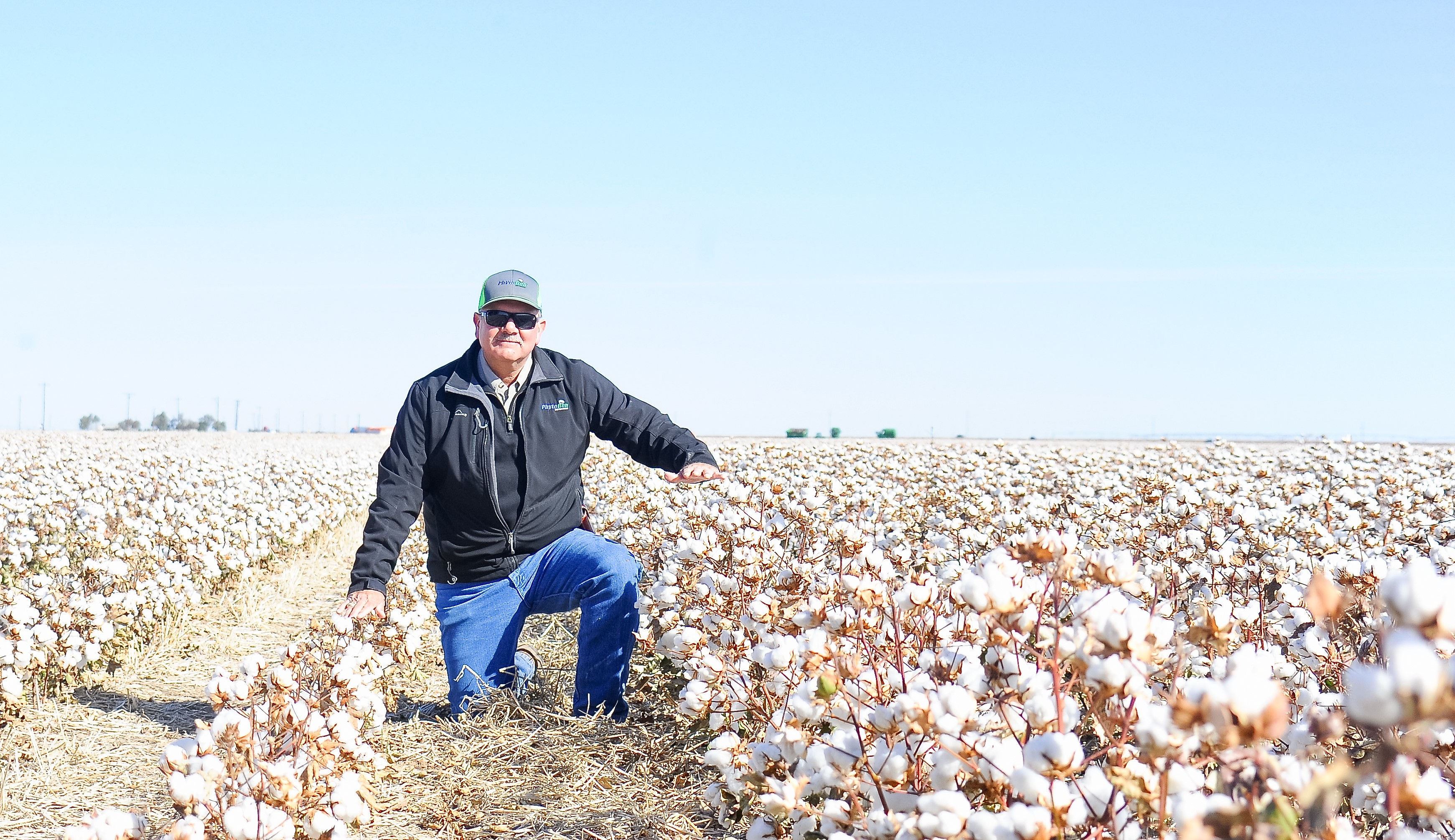NEW YIELD-PROTECTION TRAIT IS A GAME CHANGER
New PhytoGen® W3FE varieties provide the solution for nematode-ridden farms. Dean and Lacy Vardeman tell how these varieties increased yields to keep cotton on their farm.
New PhytoGen® W3FE varieties provide the solution for nematode-ridden farms. Dean and Lacy Vardeman tell how these varieties increased yields to keep cotton on their farm.
For some, it’s a welcomed increase in cotton yields. For others, it means they can keep growing cotton on their farms.
“If it wasn’t for PhytoGen, we wouldn’t be planting cotton on this farm,” declared Dean Vardeman of New Home, Texas. “We can’t afford to spend money on a crop and not get a yield.”
Vardeman and wife Lacy farm nearly 5,000 acres of cotton near Lubbock in addition to approximately 1,000 rotational acres, cattle and some swine production. For 10 years, Dean has been telling cottonseed companies that he and other producers need reniform-nematode-resistant cotton varieties. He said if they would invest in a reniform-nematode-resistant variety, he’d plant it. In 2019, he planted his first reniform nematode trial with PhytoGen® cottonseed.
“PhytoGen was the first to deliver. They’ve got good cotton anyway, but the reniform-nematode-resistant trait is a bonus. The quality is there, and it’s good yielding — a double-good thing,” Dean said.
“We’re not kidding. It’s a game-changer,” Lacy added. “The reniform resistance has kept our farm in cotton. Otherwise, we’d only be planting less profitable corn and sorghum.”
Ken Lege, Ph.D., cotton development specialist for PhytoGen cottonseed, has been working with the Vardemans to track nematode populations. While the reniform nematode numbers in this year’s test field were variable, he said the hot spots were “nuclear.”
“We not only want to provide a viable option for acres inundated with this pest, we aim to improve consistency and yields in areas where they don’t know they have nematodes. And these new varieties are proving to do that,” Lege said.

The difference in variety performance in this reniform nematode trial at Van Voigt’s farm near Slaton, Texas, is clearly illustrated by PhytoGen® Cotton Development Specialist Ken Lege, Ph.D. The reniform-nematode-resistant variety from PhytoGen cottonseed, on the right, showed an 87% to 94% yield increase from the reniform-nematode-susceptible variety, on the left.
Dean said reniform-nematode-resistant PhytoGen brand PHY 332 W3FE is a little tighter in the burr compared with the other resistant variety, PhytoGen brand PHY 443 W3FE, which is taller and showier. Before the resistant variety, one of their fields historically produced only about 1 bale/A. The farming couple expects to see at least 250 lb./A improvement, even with less than 3 inches of in-season rain, hail and harvest-time ice in 2020.
Either way, they say it’s the best cotton they’ve had on the field in 20 years, thanks to the new reniform-nematode-resistant varieties.
“We’ve gone from hoping to find a solution to something that has real promise,” Dean said, noting they’re seeing nematode populations decrease year-over-year with the resistant varieties.
The Vardemans began growing PhytoGen cottonseed about five years ago, because it had the best root-knot-nematode (RKN) resistance in the market. Dean said he was excited to try the first reniform-nematode-resistant varieties, which are also RKN-resistant, and is looking forward to a year-over-year decrease in pest populations.
Dean also likes the larger seed size of PhytoGen cottonseed, noting it’s tough to get smaller seed to emerge in the harsh West Texas conditions.
“Everyone says PhytoGen has early season vigor and good germ. It’s as good as it gets in the industry. PhytoGen comes up strong and does well,” he said.
Farther south on the High Plains, Van Voigt farms reniform-nematode-ridden farms between Slaton and Post, Texas, near the community of Southland.
“This put us back in the cotton business and ringing the bell!” Voigt exclaimed of the new reniform-nematode-resistant varieties from PhytoGen cottonseed.
Voigt saw the reniform-nematode-resistant variety double production compared with the susceptible varieties on his farm from 745 lb./A compared with 1484 lb./A in a 2020 test plot.
“The difference is eye-opening,” he said. “When you have reniform, you can put all the nutrients and water on your cotton, but the reniform steals it. With the reniform-resistant varieties, it’s just like there are no reniform.”
Voigt explained he’d never heard of reniform nematodes before working with his PhytoGen team. Voigt has since learned reniform nematodes follow water and came onto his farm about five years ago from a drip tape installation contractor.
“I didn’t have a clue what the problem was. We tried everything, but nothing helped,” Voigt said. “We knew it was serious, but we didn’t know what it was until Ken came out and did some soil samples and identified the issue.”
Voigt said that while he’s thrilled with the yield, he’s happiest about the decreasing reniform nematode populations on the acres planted to the trials for two years.
“Cotton is the only thing that makes us money,” Voigt explained.
When asked to sum up their experiences with the test fields, Voigt and the Vardemans called the new reniform-nematode-resistant varieties from PhytoGen cottonseed “a game-changer.”
Find information on yield and more in the PhytoGen Cottonseed Agronomy Library.